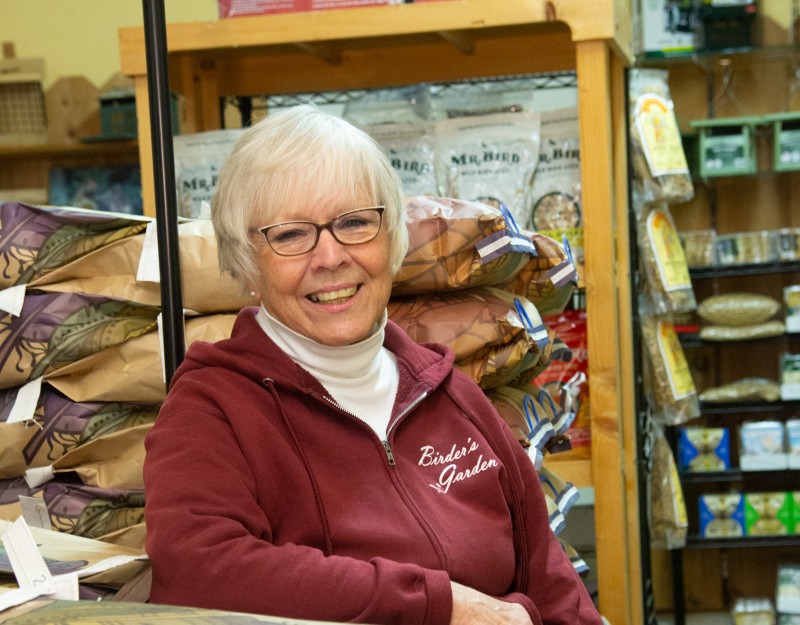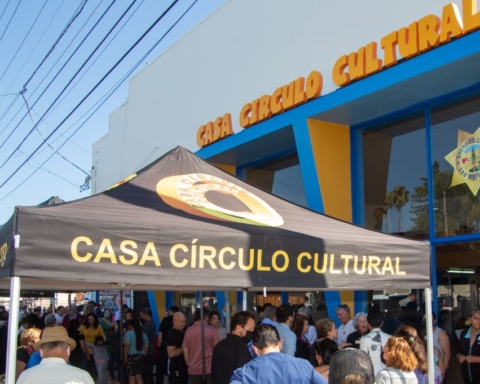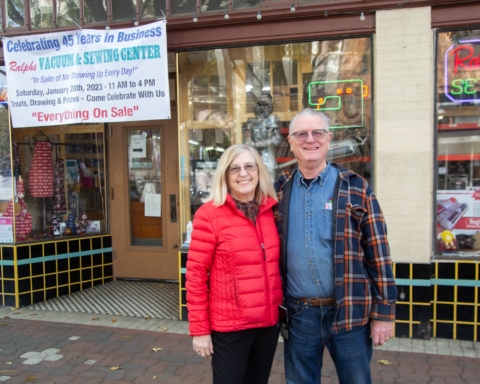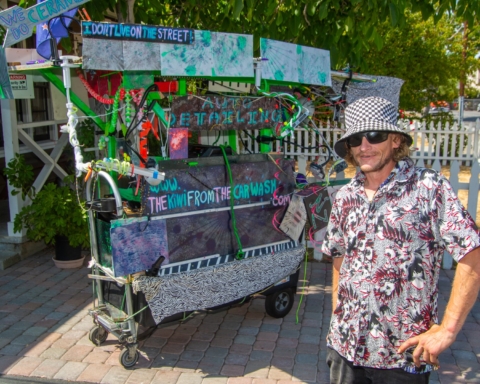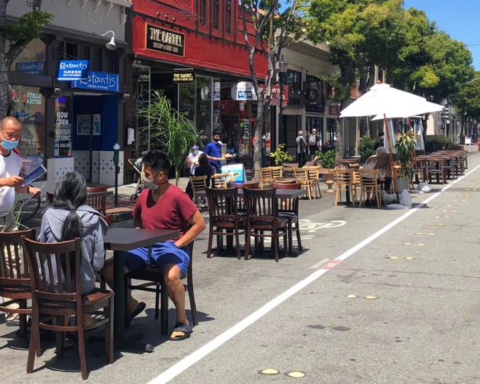By Joanne Engelhardt
More than 30 years ago, Birder’s Garden owner Bonnie Regalia found her true calling: as a small businesswoman.
Not that she knew it then, of course. At that time Birder’s Garden was owned by Rich and Marsha Held who had the San Carlos franchise of a company called Wildlife Centers of America. The chain offered just about everything for backyard birding.
“As a single mother, I wanted to work close to home and be available to my daughters,” she explains. When she learned that the Helds wanted to sell their business, Regalia saw it as the perfect opportunity for her. So she worked out the financial aspects and took over in 1991. (The store continued to be operated under the franchise name until 2006 when she renamed it “Birder’s Garden.”)
The charming little stucco store at 926 El Camino Real (sandwiched between the Rustic House Restaurant and idbydna, a medical disease testing company) can be easily missed on a drive-by.
“It’s a destination store,” explains Regalia. By that she means that people come from as far away as San Francisco, Sunnyvale and Los Altos to buy from her. Obviously she doesn’t just stock bird seed. She carries a large selection of bird baths, a couple dozen different kinds of bird seed, hundreds of bird feeders for hummingbirds, wrens, orioles and other birds, houses and nesting boxes, colorful socks, hand puppets, natural stone sculpture garden plaques, linen towels—and more.
Why Customers Return
Over the years, Regalia came to recognize that the key to getting and retaining her clientele is good customer service. “I feel strongly that the information we give our customers has to be accurate.
“I also go to great lengths to source inventory from all over the United States. I offer only American-made products as much as possible. And the products I buy to sell have to be good quality.”
It hasn’t always been easy. Once she became the owner, Regalia decided she’d better put her daughters to work in it after school. “I had to be here, so I told them I’d pay them to help me out.” Recalling those days she says, “My daughters practically grew up in the store.” She now has five grandsons.

Over the years, Regalia says she’s learned far more from her customers than she could have picked up by reading books or attending classes.
“You have to keep educating yourself about your business,” she explains. For instance, the Bay Area has five microclimates, and different ones attract different kinds of birds. That means stocking bird seed appropriate for all five.
Some Hefty Bags
She estimates she now sells between three and five tons of bird seed a week—a few 50-pound bags, but mostly five, 10 and 20 pounders. She also stocks seed for insectivorous birds who, although they mostly feed on gnats and other tiny insects, need to have a source of bird seed for when they can’t find anything else to eat.
“I don’t sell anything that has pesticides or insecticides,” she emphasizes. She points out that she sells organic bird seed but doesn’t label it as such because different states have specific requirements that have to be met to label it organic.
Eventually more and more businesses started putting up their own websites and Regalia recognized that to continue to be profitable, she’d need to have an online presence, too. Today her birdersgarden.com website brings in about 20 percent of her business.
Over the years, she decided to use it to help educate her customers by including sections on birding basics, common winter birds in the Bay Area, and the history of National Bird-Feeding Month (February). She also writes a twice-a-month email newsletter for customers who sign up for it. The December newsletter featured several holiday gift ideas like a suet ball feeder, a snail garden rain gauge and roosting pockets for non-migrating songbirds.
Birding Advice
Her “Birding Basics” online page is must reading for her clientele because it covers a wide variety of diverse tips. Reading her accurate, no-nonsense advice, it seems logical to dub her the “Dear Abby” of bird enthusiasts.
Here are a few samples on topics such as how to keep ants and weeds away from bird feeders, how to make the suet, and how to store seeds:
- Ants: Install an ant moat with a light coating of cooking oil above the feeder to prevent them from crawling into it.
- Homemade suet recipe: 1 cup chunky peanut butter; 2 cups vegetable shortening, 1 cup flour, 1 cup rolled oats, 1 cup coarse corn meal, 1 cup sunflower chips, medium crushed egg shells.
- Seed storage is most successful in a galvanized can with a locking lid. To prevent moisture from building up, line the can with a plastic garbage bag. Adding a bay leaf in the seed will prevent seed moths from forming.
- Got weeds? If you have weeds under your feeders, consider switching to Sunflower Chips or No-Mess Mixes. Seeds without shells will not germinate.
As her business has grown, Regalia kept up with it by hiring seven part-time employees to work in the store and help her with stocking, paperwork and shipping. Two dogs (one hers) sometimes come to work with their masters and wander around checking out the store and its customers.

In the past two years, Regalia has had to contend with new challenges, not the least of which was the Covid pandemic. That, coupled with problems associated with hundreds of ships unable to unload their cargo, make getting sufficient inventory a persistent worry.
Local Suppliers
So the pragmatic business owner decided to source more of her products locally. Now she sells jewelry, hats, colorful socks, cards and linen towels, many of which she highlights by adding a sign that says “local artist.”
It may come as a surprise that Regalia didn’t come to her profession by starting out as a birder.
“I was raised in the Midwest right on Lake Michigan,” she explains. “I loved the outdoors, but my interest in buying Birder’s Garden was simply that I had always wanted to own my own business. Now, after all these years of running my store, I know that I’d rather be doing this than anything else.”
That seems obvious when Regalia unexpectedly gets a phone call. What does her phone chime sound like? Chirping birds—what else?


